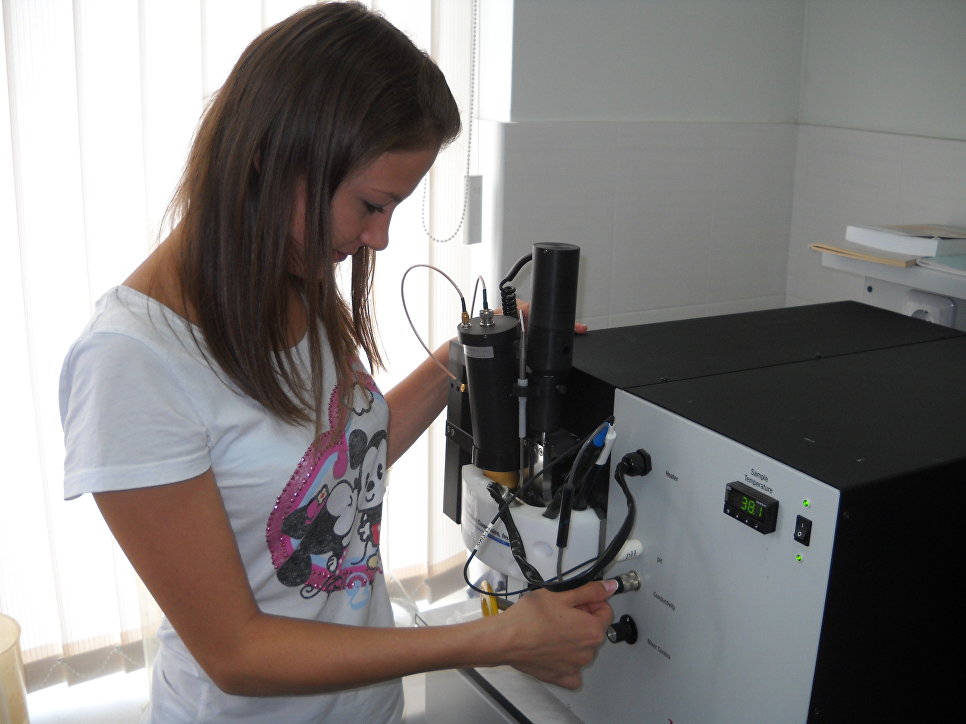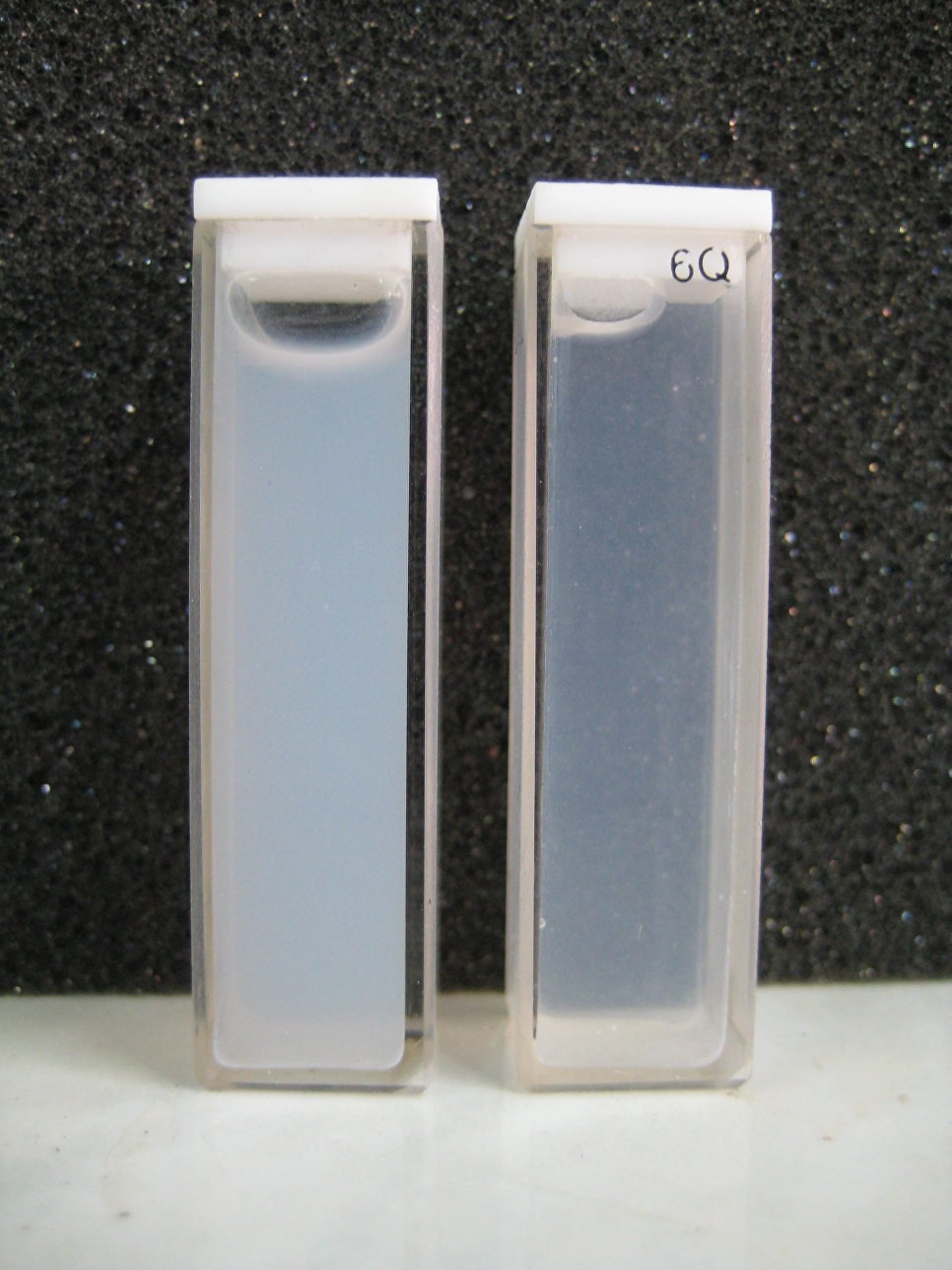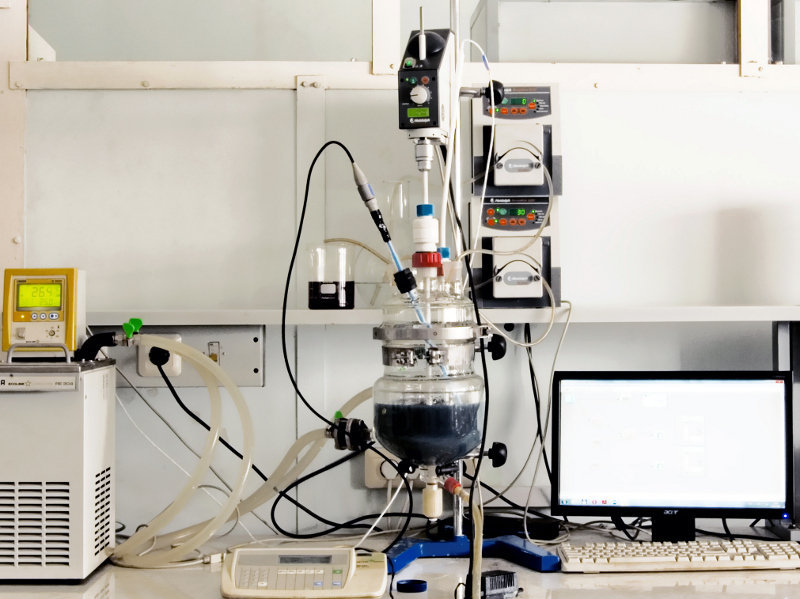Young scientists of NITU "MISiS" created a universal UV filter
Researchers at the National Research Technological University (NITU) MISiS, by chemical synthesis and subsequent modification of zinc oxide nanoparticles, obtained a universal protective filter against ultraviolet radiation. The versatility of the filter is that it can be used both in the polymer industry and in cosmetology, and the peculiarity is that it was possible to make the filter transparent, not white. The research results were published in the journals of Current Nanoscience and the Journal of Alloys and Compounds , a Russian patent was obtained.

Candidate of Chemical Sciences S.I. Senatova measures the value of the zeta potential of zinc oxide nanoparticles in solution.
Almost every person "burned" in the sun. The cause of these burns is exposure of the skin to ultraviolet radiation. The most dangerous from the point of view of the intensity of exposure is considered to be UV radiation of type B in the range from 305 to 320 nm. In large quantities, ultraviolet radiation can also lead to mutations that cause melanoma (skin cancer) and premature aging of skin cells. In addition, ultraviolet radiation destroys many polymers (organic glass, polyethylene, polypropylene, etc.), this phenomenon is known as "ultraviolet aging."
Various filters (additives added to polymer compositions and sunscreens) are widely used to protect against the harmful and damaging effects of UV radiation throughout the world. Metal oxides (for example, titanium dioxide or zinc oxide) are widely used as filters. But a number of researchers argue that titanium dioxide nanoparticles can have a carcinogenic effect (cause cancer), and zinc oxide paints products based on it white, which deprives the transparency of polymer packaging (zinc oxide, in particular, produces white paint "white zinc ).

Appearance of dispersions of zinc oxide in water containing unmodified (left) and modified (right) nanopowders .
“ To solve the problem of creating a transparent zinc oxide and manufacturing a universal ultraviolet filter on its basis, the research team of NUST“ MISiS ”together with colleagues from the Russian Cancer Research Center NN Blokhin proposed a method of chemical synthesis of zinc nanoparticles with a modified surface , ”said Alevtina Chernikova, the rector of NITU“ MISiS ” .
Scientists have learned how to control the optical properties of UV filters based on zinc oxide nanoparticles directly during their chemical synthesis. In the experiments, a solution of nanoparticles, as well as polypropylene films with a nano-additive, demonstrated 100% absorption of type B ultraviolet.
“ We synthesized nanoparticles of zinc oxide with a modified surface, ” says one of the research participants, a researcher at NITU “MISiS”, Ph.D. Svetlana Senatova . - A study of how surface modification affects the chemical and physical properties of zinc oxide nanoparticles has shown that the resulting nanoparticles can be successfully used as filters for protection against UV radiation. In vitro experiments demonstrated the absence of hemotoxicity of the synthesized nanoparticles with a surface modified with silane-containing compounds when incubated with donors ' blood . ”
Since the small size of the nanoparticles allows them to penetrate the skin layers and enter the human body, the researchers need to understand how they will affect the blood cells of healthy people.

Appearance of the unit (APC "Nanohim") of chemical synthesis of nanoparticles in NITU "MISiS"
According to the authors of the development, modifying the surface of zinc oxide nanoparticles leads to an increase in their transparency in the visible part of the spectrum, which allows them to be used not only as part of sunscreen, but also in the manufacture of transparent polymers. Such materials can be used, for example, in the manufacture of transparent food containers, films or in facing panels of structures installed under the open sky. In addition, modifying the surface of the nanoparticles will reduce the amount of added UV filter by 5-10 times, which entails a positive economic effect.

Candidate of Chemical Sciences S.I. Senatova measures the value of the zeta potential of zinc oxide nanoparticles in solution.
Almost every person "burned" in the sun. The cause of these burns is exposure of the skin to ultraviolet radiation. The most dangerous from the point of view of the intensity of exposure is considered to be UV radiation of type B in the range from 305 to 320 nm. In large quantities, ultraviolet radiation can also lead to mutations that cause melanoma (skin cancer) and premature aging of skin cells. In addition, ultraviolet radiation destroys many polymers (organic glass, polyethylene, polypropylene, etc.), this phenomenon is known as "ultraviolet aging."
Various filters (additives added to polymer compositions and sunscreens) are widely used to protect against the harmful and damaging effects of UV radiation throughout the world. Metal oxides (for example, titanium dioxide or zinc oxide) are widely used as filters. But a number of researchers argue that titanium dioxide nanoparticles can have a carcinogenic effect (cause cancer), and zinc oxide paints products based on it white, which deprives the transparency of polymer packaging (zinc oxide, in particular, produces white paint "white zinc ).

Appearance of dispersions of zinc oxide in water containing unmodified (left) and modified (right) nanopowders .
“ To solve the problem of creating a transparent zinc oxide and manufacturing a universal ultraviolet filter on its basis, the research team of NUST“ MISiS ”together with colleagues from the Russian Cancer Research Center NN Blokhin proposed a method of chemical synthesis of zinc nanoparticles with a modified surface , ”said Alevtina Chernikova, the rector of NITU“ MISiS ” .
Scientists have learned how to control the optical properties of UV filters based on zinc oxide nanoparticles directly during their chemical synthesis. In the experiments, a solution of nanoparticles, as well as polypropylene films with a nano-additive, demonstrated 100% absorption of type B ultraviolet.
“ We synthesized nanoparticles of zinc oxide with a modified surface, ” says one of the research participants, a researcher at NITU “MISiS”, Ph.D. Svetlana Senatova . - A study of how surface modification affects the chemical and physical properties of zinc oxide nanoparticles has shown that the resulting nanoparticles can be successfully used as filters for protection against UV radiation. In vitro experiments demonstrated the absence of hemotoxicity of the synthesized nanoparticles with a surface modified with silane-containing compounds when incubated with donors ' blood . ”
Since the small size of the nanoparticles allows them to penetrate the skin layers and enter the human body, the researchers need to understand how they will affect the blood cells of healthy people.

Appearance of the unit (APC "Nanohim") of chemical synthesis of nanoparticles in NITU "MISiS"
According to the authors of the development, modifying the surface of zinc oxide nanoparticles leads to an increase in their transparency in the visible part of the spectrum, which allows them to be used not only as part of sunscreen, but also in the manufacture of transparent polymers. Such materials can be used, for example, in the manufacture of transparent food containers, films or in facing panels of structures installed under the open sky. In addition, modifying the surface of the nanoparticles will reduce the amount of added UV filter by 5-10 times, which entails a positive economic effect.
All Articles